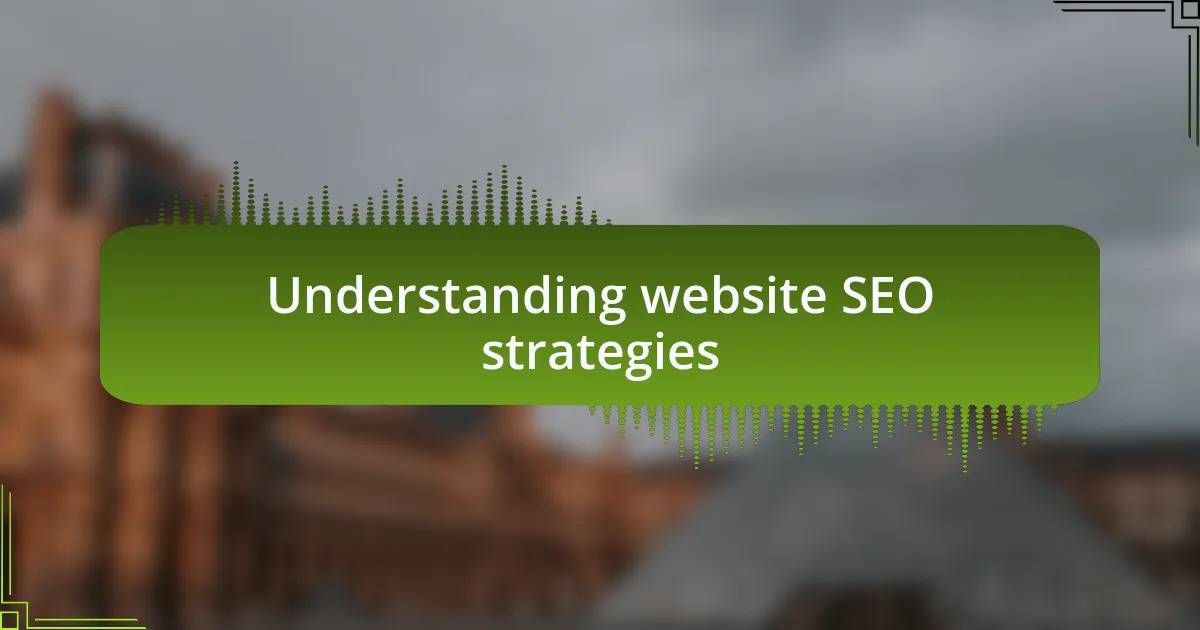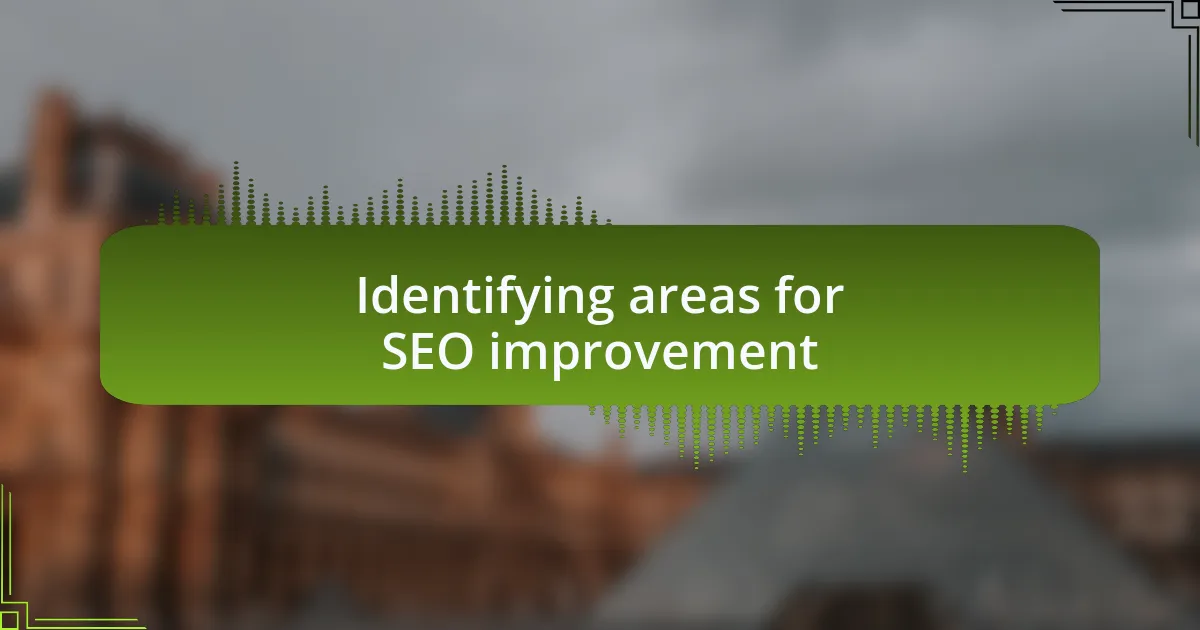Key takeaways:
- Mastering keyword research is essential for attracting visitors and optimizing site visibility.
- Backlinks significantly enhance site credibility and search rankings when cultivated through relationships with relevant sites.
- Improving user experience and site performance directly impacts SEO effectiveness and visitor engagement.
- Analyzing SEO performance data can uncover valuable insights for refining content strategy and enhancing user interactions.

Understanding website SEO strategies
Understanding website SEO strategies encompasses a variety of techniques aimed at optimizing site visibility and enhancing user experience. From my experience, I found that mastering keyword research is a crucial first step. It was eye-opening to realize how the right keywords can essentially serve as signposts, guiding potential visitors directly to my site.
I remember when I first started experimenting with on-page SEO elements, like meta tags and headers. It was frustrating at times, yet immensely rewarding to see how a simple adjustment could lead to a noticeable uptick in traffic. Have you ever felt that thrill when you notice a spike in your site metrics? It’s a satisfying reminder that these strategies are not just theoretical; they can have real-world impacts.
Moreover, understanding the importance of backlinks really transformed my approach to SEO. Initially, I underestimated these links, but as I began to cultivate relationships with relevant sites, I experienced the significant boost that quality backlinks can bring. Isn’t it fascinating how building connections in the digital world can elevate your site’s credibility and ranking?

Importance of SEO for businesses
The significance of SEO for businesses cannot be overstated. When I first launched my website, I quickly learned that without a solid SEO strategy, my efforts were like shouting into a void. How can one expect to attract visitors if they can’t even find their site amidst the noise of countless competitors? That realization pushed me to prioritize SEO as a fundamental component of my business strategy.
Businesses today operate in an increasingly digital landscape where visibility is paramount. I remember one particular campaign where, after optimizing my content for search engines, traffic surged by 50% within just a few weeks. That experience made me appreciate how a well-executed SEO plan can turn a struggling site into a busy hub of activity. It’s amazing to think that a handful of well-placed keywords and strategic content can translate into tangible results.
Moreover, engaging with SEO builds trust with potential customers. I once received a message from a visitor who said they chose to explore my site because it appeared at the top of the search results. That moment was a revelation for me. It hit me that good SEO doesn’t just enhance visibility; it helps establish credibility. Have you experienced a similar moment where improved visibility translated into trust and, ultimately, sales?

Identifying areas for SEO improvement
To identify areas for SEO improvement, I began by analyzing my website’s performance metrics. I utilized tools like Google Analytics to track visitor behavior and pinpoint which pages were underperforming. It was surprising to see how some of my most promising content attracted minimal traffic simply because I hadn’t optimized it correctly. Have you taken the time to dive into your data?
Next, I focused on user experience. I realized that slow loading times or difficult navigation could deter visitors, which made me rethink the layout and design of my site. Once I improved these aspects, not only did the bounce rate drop, but my audience started staying longer and engaging more deeply with my content. It’s amazing how enhancing user experience can reflect directly on your SEO efforts.
Lastly, keyword research was a game changer for me. I initially targeted overly broad terms, but after refining my focus to long-tail keywords, I noticed a marked improvement in my search rankings. This experience taught me that understanding my audience’s specific needs and how they search for information can make all the difference. Are you leveraging the right keywords for your audience?

Implementing effective SEO techniques
Implementing effective SEO techniques has been a transformative experience for my website. One technique that stood out was optimizing on-page elements, such as title tags and meta descriptions. Initially, I overlooked these vital components, but once I crafted unique, keyword-rich tags, I saw substantial traffic increases. Have you considered how much a simple title can impact your search visibility?
Another strategy I embraced was creating high-quality, relevant content. I shifted my focus from just filling pages with information to addressing the specific questions my audience had about audiovisual topics. This change not only elevated my site’s authority but also fostered a sense of trust with my readers. I felt more connected to my audience as they engaged with content that genuinely served their needs. What kind of content resonates with your visitors?
Finally, I realized the importance of building backlinks. Initially, this seemed daunting, but I started by reaching out to industry peers and engaging with relevant online communities. I was surprised by how positively people responded, leading to valuable partnerships that enhanced my website’s credibility. How are you approaching link building to strengthen your SEO?

Learning from SEO performance data
Understanding SEO performance data has been a game changer for me. I used to see analytics just as numbers on a screen, but once I started to analyze user behavior—like bounce rates and session durations—I realized what my visitors truly wanted. For instance, when I noticed a high bounce rate on specific pages, it became clear that I needed to revamp that content. Have you taken the time to dig into your analytics for insights?
I also found value in tracking keyword performance over time. Initially, I was obsessed with rankings, but then I began looking at how users interacted with the keywords that drew them to my site. By identifying keywords that brought in engaged users, I could refine my content strategy to cater to those interests, which was both insightful and satisfying. What keywords resonate with your audience that you might be overlooking?
Finally, I learned the importance of monitoring my competitors’ SEO strategies. I was surprised by how many valuable insights I gained by simply looking at what others in the audiovisual industry were doing. This not only inspired new ideas for my content but also helped me identify gaps in my strategy. Have you ever compared your site’s performance to that of your competitors?